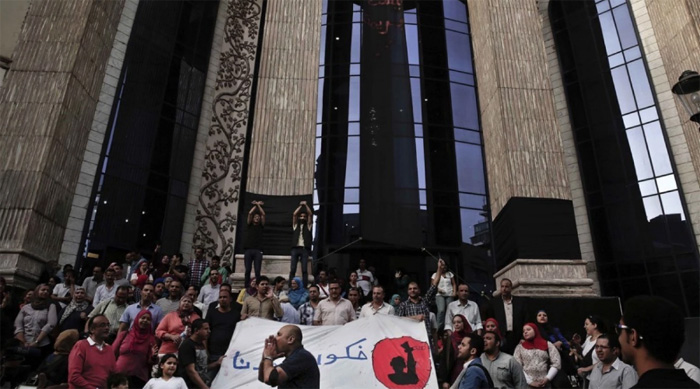As the rest of the world celebrated World Press Freedom Day, Egyptian journalists raised black flags above the historic press union headquarters in downtown Cairo.
The flags were a solemn protest to “mourn the terrible conditions facing Egyptian journalists” said Khaled el Balshy, head of the union’s freedom committee.
Egyptian authorities are waging what critics deem “a flagrant attack” on journalists.
Journalists have been staging a sit-in since Sunday night at the press union building to protest what the head of the union, Yehia Qallash, called an “unlawful and unconstitutional” raid by 50 security personnel and the arrest of journalists Amr Badr and Mahmoud Sakka.
Prior to their arrest, the journalists had been peacefully protesting police crackdowns that occurred last month against the handover of two Red Sea islands to Saudi Arabia.
Both journalists' homes were raided by security forces in the lead up to the protests, and arrest warrants were issued against them for “possession of firearms and Molotov cocktails with the aim of carrying out attacks against police, army forces and vital facilities,” prosecutors said in an official statement.
On Saturday, 237 protesters went on trial for demonstrating against the deal. If convicted, they could face jail time of up to three years.
Egypt ranks as the second worst jailer of journalists worldwide, with 23 journalists currently behind bars, according to the Committee to Protect Journalists. But this would be the first time the police raided the union since its inception 75 years ago.
Even the largest state owned newspaper, Al Ahram, considered the mouthpiece of the government, condemned the raid. It warned that the “interior ministry would not succeed in its malicious aim of gagging mouths.”
“Have we as journalists, along with our youth, become the enemies of the state?” the newspaper asked.
The union has called for the dismissal of interior minister, Magdy Abd el Ghaffar.
The interior ministry said in a statement that the arrests were conducted in accordance with the law and that it “respects the role of journalists.”
On Tuesday, however, the ministry accidentally sent an internal memo from its public relations department to several journalists, who promptly shared it on social media. In the memo, the ministry claimed that a number of journalists, including Qallash and Balshi, were “escalating” the conflict ahead of union elections and that the ministry would face a “vicious public campaign” from the media that would be countered through security officials calling in to TV shows to defend the ministry’s position.
The crackdown has not been limited to local journalists. There is an ongoing police investigation of the Reuters news agency and its bureau chief, Micheal Georgy, since they published a report on the murder of Italian labor rights researcher, Giulio Regeni. In the report, six police and intelligence sources confirmed that the Cambridge university student had been detained by police the night he vanished.
The case has not yet gone to court, but Georgy could face up to a year in prison and a fine.







Comments